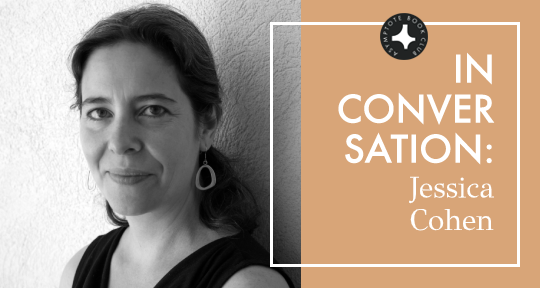For the month of October, the Asymptote Book Club is doubly proud to present our October selection, Ronit Matalon’s And the Bride Closed the Door, as it not only won Israel’s prestigious Brenner Prize, but was also translated by Man Booker winner Jessica Cohen. In the following interview, the translator talks to Asymptote’s Josefina Massot about her complex relationships with the author, her love for translating dialogue, and her bicultural self.
The Asymptote Book Club is our gift to readers in the US, the UK, and the EU. Bringing the most notable titles in translated literature for as little as USD15 per book, you can sign up to receive next month’s selection on our website; once you’re a member, you can join the online discussion on our Facebook page.
Josefina Massot (JM): Your first book-length translation happened to be Ronit Matalon’s Bliss, her second novel and second work to be published in English overall. What drew you to her so early on, before she hit the level of international recognition she enjoys today?
Jessica Cohen (JC): Bliss (which in Hebrew was titled Sarah, Sarah) was Matalon’s second novel, but she had previously published a YA novel, a collection of short stories, and numerous journalistic and opinion pieces, so she was quite well known in Israel in both literary and political circles. I had read her first novel, The One Facing Us (translated by Dalya Bilu) and found it fascinating. I was certainly excited and honored to be asked to translate her novel, although since I was in the very early stages of my career, I was not really in a position to pick and choose anyway.
JM: You were each more or less getting started back then, and were also, I take it, able to exchange thoughts on the translation. And the Bride Closed the Door found you both in a radically different place: at the top of your game but presumably unable to engage as much due to Matalon’s untimely death two years ago. How did these factors—your evolution as translator and novelist, your sudden inability to fully interact—affect the translation process? What, if anything, didn’t change?
JC: When I translated Bliss I did meet with Ronit to consult with her about the translation, but our contact was quite minimal. This was both because I was an absolute beginner and still unsure of what the translator-author relationship typically looked like, and because Ronit was busy with other projects and explained to me that she found it difficult to step back into this novel that was, from her perspective, something she had moved on from. She did offer to answer specific questions should they arise, and we corresponded a little after I had finished my first draft (this was before email was such a large part of our lives, and if I remember correctly we exchanged faxes), but I think that at the time I felt I should do my best to struggle through difficult parts of the text and not “bother” the writer too much. I have since learned that discussing the text with the author is actually one of the most rewarding—and important—aspects of my work, and I have been told by a number of authors that they worry when a translator has no questions at all. READ MORE…

